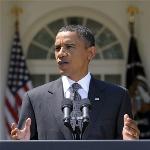30 August 2010

Photo: AP
President Barack Obama at the White House 30 Aug 2010
The president is expected to explain to Americans what the U.S. has accomplished in Iraq since 2003, underscore a continuing commitment to Iraq's stability, and pay tribute to the sacrifices by American military personnel.
The U.S. Defense Department puts the number of U.S. troops killed in Iraq at more than 4,400, with nearly 32,000 wounded.
President Obama has stressed that regardless of whether one opposed or supported former President George W. Bush's decision to invade Iraq in 2003, Americans must honor the sacrifices of the U.S. military in helping to bring the United States to the point of formally ending combat operations.
What Mr. Obama said about the war in Iraq before he became president and what he says he believes now about the conflict were a major topic of Monday's White House news briefing.
Observing that if Mr. Obama had been president in 2003, the U.S. would never have invaded Iraq, Press Secretary Robert Gibbs said the president has been consistent in criticizing a focus on Iraq rather than on Afghanistan.
"Iraq, without a doubt, took our emphasis and our commitment off of Afghanistan. In many ways, we are having to make up for years of that - years of not having the necessary number of forces in a country [i.e., Afghanistan] that poses an actual threat to our own security," Gibbs said.
Gibbs said Mr. Obama will attempt to put into a broader context what the U.S. military draw down in Iraq means for national security efforts and the fight against al-Qaida in Afghanistan, Southeast Asia and elsewhere.
Reporters asked Gibbs about any comparison between President Obama's speech, and the now famous remarks in 2003 by former President George W. Bush who, standing against a backdrop of a large "mission accomplished" banner, said: "In the Battle of Iraq, the United States and our allies have prevailed."
While the transition from a combat role in Iraq is a milestone, Gibbs said it does not mean that violence will end. He went on to outline the responsibilities that Iraqis will now bear.
"What it means also is that this redoubles the efforts of the Iraqis. They will write the next chapter in Iraqi history and they will be principally responsible for it. We will be their ally. But the responsibility of charting the future of Iraq, first and foremost, belongs to the Iraqis," he said.
President Obama has set an end of 2011 timeline for withdrawing all U.S forces from Iraq. Until then, fewer than 50,000 American troops will advise and assist Iraqi forces, conduct counterterrorism operations and protect U.S. civilians and diplomats.
Fred Kagan, resident scholar at the American Enterprise Institute, says Mr. Obama should avoid stressing anything that sounds like a declaration of a mission having been accomplished.
"The mission is not accomplished in the sense of the establishment of a long-term, stable relationship with an Iraq that can defend itself and be stable in the region. That mission has not been accomplished. That is a core American national security interest," Kagan said.
In a recent New York Times interview, the outgoing U.S. commander in Iraq, Army General Ray Odierno, said the United States entered Iraq in 2003 "very naive" about the problems there, and he expressed concern about how long it will take to resolve Iraq's political stalemate.
Press Secretary Gibbs said on Monday that, with the way it went into Iraq and with the type of resources it went in with, the United States made some "pretty huge strategic and tactical errors."
Resolving Iraq's political stalemate is one of the priorities on Vice President Joe Biden's agenda as he visits Baghdad. Biden will formally acknowledge on behalf of the Obama administration the end of the U.S. combat mission and handover of security responsibilities to Iraqis.